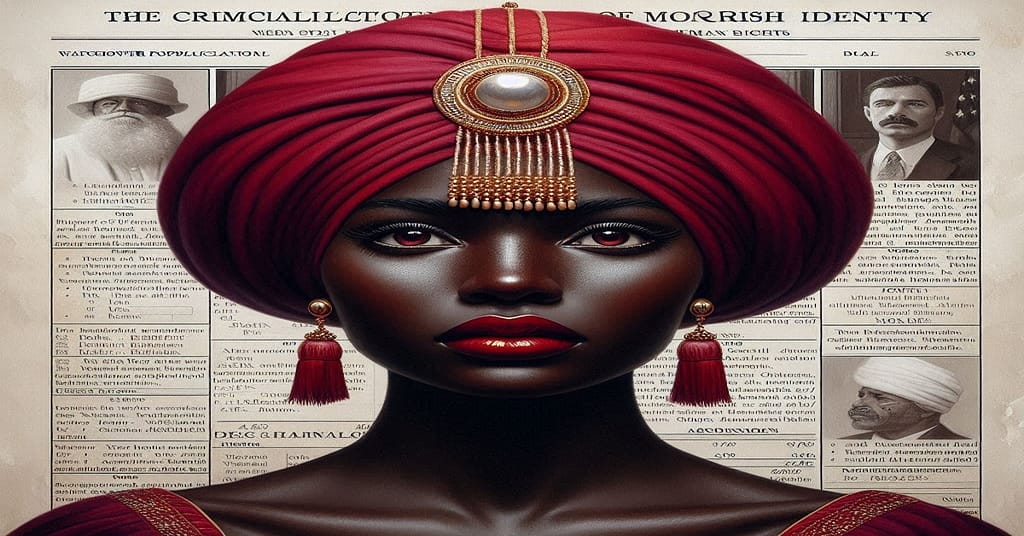The Moorish identity has deep historical roots that trace back to the presence of the Moors in North Africa and their eventual migration to various parts of the world, including what is now where the United States does business. Historically, they were renowned for their contributions to civilization, particularly in areas such as architecture, science, and philosophy during the medieval period. This rich legacy, however, has often been overshadowed by systemic attempts to erase or undermine Moorish identity, particularly in contemporary America where individuals identifying as Moorish Americans face significant legal and societal challenges.

American Moors, who assert their identity as descendants of the original inhabitants of the land, often find themselves in conflict with state institutions that fail to recognize their human rights. The cultural and ancestral roots of Moorish Americans are closely linked to indigenous rights, as their historical narrative includes stories of sovereignty and resilience against oppression. Their claims can be associated with the United Nations Declaration on the Rights of Indigenous Peoples (UNDRIP), which emphasizes the importance of acknowledging and respecting the rights of indigenous communities worldwide. However, many state attorneys general have framed the assertion of Moorish identity and sovereignty as a legal threat, contributing to a wider pattern of human rights violations against those who identify as sovereign citizens.
This ongoing tension between Moorish identity and state legal frameworks is emblematic of broader issues regarding human rights recognition, particularly for communities that have historically been marginalized. The struggle of Moorish Americans for validation of their indigenous rights and historical claims against state interpretations is not merely a legal dispute; it is a matter of preserving their cultural integrity and ensuring that their rights as human beings are upheld in accordance with national and international standards. Understanding this conflict is crucial to appreciating the complexities surrounding the current discourse on identity, sovereignty, and human rights violations.
Overview of State Attorneys General’s Actions
In recent years, a concerning trend has emerged involving various state attorneys general targeting individuals of Moorish descent, often labeling them as ‘sovereign citizens.’ This designation is not just a superficial classification, but rather a legal term that has significant implications for those who identify as Moorish Americans. The label implies a rejection of state authority and legal jurisdiction, which can lead to severe consequences, including arrest and prosecution. Such actions induce a systemic criminalization of Moorish identity and perpetuate a broader pattern of human rights violation.
Many legal initiatives and guidelines have been created to define and differentiate groups labeled as ‘sovereign citizens,’ often disregarding the unique cultural and historical context of Moorish Americans. This framing places Moorish individuals in a precarious position, often stripping them of basic rights under the guise of legal enforcement. As state attorneys general utilize this terminology, they inadvertently support a narrative that portrays a significant portion of the population as threats to societal stability, further exacerbating the inequities faced by these communities.
The implications of such labeling extend beyond legal definitions; they also affect public perception, reinforcing negative stereotypes and social stigma associated with Moorish identity. The criminalization of Moors represents not just an insensitive approach to law enforcement, but also a violation of fundamental human rights as articulated in the United Nations Declaration on the Rights of Indigenous Peoples (UNDRIP). This international framework aims to protect the rights of indigenous populations, including their identity, culture, and legal status. Ignoring these rights fosters a cycle of discrimination and marginalization against Moorish Americans, highlighting the urgency for reform in these systemic practices.
Human Rights Violations and Legal Frameworks
The actions of state attorneys general against individuals identifying as Moorish Americans raise significant concerns related to human rights violations. Such actions not only undermine the identity of these individuals but also contravene established legal frameworks designed to protect fundamental rights. The United Nations Declaration on the Rights of Indigenous Peoples (UNDRIP) articulates the rights of indigenous groups, emphasizing their right to self-identification and cultural preservation. By targeting those who assert their Moorish identity, state entities effectively deny these applicants the recognition afforded by international law.
This clash between law and practice exemplifies a broader trend where legal structures fail to safeguard the rights of marginalized groups. The UN’s Universal Declaration of Human Rights establishes that all individuals are entitled to cultural rights, yet the targeting of Moorish Americans by state officials illustrates systemic disregard for these principles. The legal frameworks aimed at protecting human rights are rendered ineffective when they are not enforced or are directly contradicted by state actions. This dissonance raises questions about the effectiveness of these legal safeguards when confronted with politically motivated actions against sovereign citizens.
Moreover, state attorneys general often employ legal tactics that undermine the status of Moorish Americans, framing their identity as fraudulent or illegitimate. This characterization not only perpetuates stereotypes but also constitutes a violation of their rights under both international and domestic law. The impact of such legal aggression creates an environment of fear and marginalization among Moorish communities, which ultimately further exacerbates human rights violations. Understanding the nuances of how these legal frameworks interact with the rights of Moorish Americans is essential in addressing the existing gaps, promoting awareness, and advocating for equitable treatment under the law.

Impact on the Lives of American Moors
The criminalization of Moorish identity has led to profound repercussions for American Moors, affecting various aspects of their lives, including social interactions, economic opportunities, and overall psychological well-being. Individuals identifying as Moors have frequently reported experiencing discrimination and prejudice, resulting from a generalized societal misunderstanding of their cultural heritage and identity. This shift in perception, characterized by the labeling of Moorish Americans as “sovereign citizens,” has not only marginalized a community but has also led to tangible consequences for its members.
Personal testimonials highlight the adverse effects on employment opportunities for American Moors. Many have encountered significant barriers when seeking job placements, often facing accusations of being associated with extremist ideologies. This stigma can discourage potential employers and lead to job rejections, thereby impacting the financial stability of individuals and their families. For instance, one Moorish American shared their experience of being overlooked for a position after disclosing their identity. Such experiences underscore the ongoing human rights violation where the identity itself becomes a basis for discrimination, stripping away merit-based employment opportunities.
Furthermore, housing stability is another critical area impacted by the criminalization of Moorish identity. Many have found it challenging to secure housing due to the negative associations tied to their cultural identity. This has forced some American Moors to live in unstable conditions or face unwarranted evictions, which only exacerbates their social isolation. Community relations have also suffered, as misunderstandings about Moorish beliefs and practices contribute to a reluctance among neighbors and local organizations to engage with Moorish Americans. In many cases, the lack of awareness surrounding the United Nations Declaration on the Rights of Indigenous Peoples (UNDRIP) exacerbates these issues, leaving American Moors without adequate support and recognition of their rights.
In conclusion, the ramifications of labeling Moorish identity as a form of criminal behavior are extensive, impacting employment, housing, and social relations. The experiences of American Moors illustrate a clear human rights violation that extends beyond personal prejudice, affecting community cohesion and personal dignity.
Targeting by Private Corporations and Law Enforcement
The criminalization of Moorish identity has resulted in significant challenges for Moorish Americans, especially when interacting with private corporations and law enforcement. The branding of Moors as individuals engaged in unlawful activity has led to widespread discrimination and profiling that permeates various sectors of society. Private corporations, under the influence of prevailing narratives that equate Moorish identity with criminal behavior, often deny services based on unfounded biases. This discriminatory practice not only increases social stigma but also exacerbates the struggles faced by Moorish Americans in their daily lives.
Law enforcement agencies also contribute to this systemic issue. Individuals identifying as sovereign citizens or members of the Moorish community may find themselves unjustly targeted in routine interactions. Instances of excessive surveillance and unwarranted stops, often motivated by preconceived notions rather than actual suspicion, highlight the severe implications of human rights violations in these contexts. Moreover, the application of aggressive tactics by law enforcement has resulted in heightened tensions between Moors and public safety officials, further alienating these individuals from the institutions meant to serve and protect them.
The broader social consequences of these discriminatory actions cannot be understated, as they perpetuate an environment of mistrust and fear among Moorish Americans. Interactions with various public services can become fraught with challenges, rooted in the negative stereotypes perpetuated by law enforcement and private corporations alike. Denial of equal access to services, compounded by societal discrimination, illustrates a critical failure to uphold human rights as outlined by the United Nations Declaration on the Rights of Indigenous Peoples (UNDRIP). The situation necessitates a concerted effort to challenge these injustices and create pathways for understanding and inclusivity for all, regardless of identity or heritage.
Arguments Against the Labeling of Sovereign Citizens
The label “sovereign citizen” carries with it a myriad of negative connotations that can mischaracterize individuals and their motivations. This term has become a catch-all phrase used by various authorities, particularly some State Attorneys General, to describe a group that largely consists of individuals who identify as Moorish Americans or who pursue an identity connected to their indigenous origins. This mislabeling not only undermines the dignity of those individuals but also can lead to human rights violations, as it invokes stereotypes that are often linked with criminal behavior and anti-government sentiment.
The historical abuse of the term “sovereign citizen” is important to acknowledge. Its origins are steeped in a context where legitimate movements for civil rights, such as those embraced by Moorish Americans and other groups advocating for their indigenous rights, are dismissed as extremist or criminal. Such stereotypes can perpetuate discrimination and ignore the broader context of the United Nations Declaration on the Rights of Indigenous Peoples (UNDRIP), which emphasizes the rights of individuals to assert their identity free from oppression or marginalization. Employing the term “sovereign citizen” obscures the authentic identities and struggles of those who simply wish to embrace their cultural heritage and pursue a life free from undue state interference.
Furthermore, labeling individuals in this way poses significant risks to civil liberties. Such designations can lead to targeted surveillance, legal repercussions, and social ostracism. When the focus shifts away from constructive dialogue towards labeling, the opportunity to address legitimate grievances of communities, including those of Moorish Americans and others affected by human rights violations, is lost. It is crucial to recognize the importance of reframing the terminology so as to respect individual identities and uphold fundamental rights, allowing for a more just and inclusive society.
Advocacy and Legal Recourse for American Moors
The quest for justice faced by Moorish Americans is bolstered by various advocacy groups and organizations that strive to protect the rights and identities of individuals within this community. These groups recognize the discriminatory practices that lead to the criminalization of Moorish identity, viewing this as a clear human rights violation. Efforts to combat these injustices often involve a multidimensional approach, combining legal action, education, and public outreach.
One of the primary avenues for legal recourse lies in the court system. Individuals experiencing adverse actions due to their Moorish identity, such as unjust detainment or denial of rights, can seek to file lawsuits against state entities. Legal representatives from regional and national advocacy organizations often assist these individuals in asserting their rights as recognized under frameworks like the United Nations Declaration on the Rights of Indigenous Peoples (UNDRIP). Such frameworks provide a basis for arguing that the criminalization of Moorish identity contradicts internationally recognized human rights standards.
Additionally, advocacy groups engage in public awareness campaigns to inform both the Moorish community and the general public about these violations. By raising awareness, they attempt to foster understanding and support while challenging the prevailing narratives that undermine the identity of sovereign citizens and Moors. Petitions advocating for more equitable treatment and recognition can also be mobilized to garner widespread support from allies outside the community.
Through ongoing litigation, public awareness initiatives, and community organization, there is a growing resistance against systemic injustices faced by Moorish Americans. This coordinated effort illustrates a determined response to the human rights violations that have historically marginalized their voices, and indicates a vital step toward reclaiming their rightful place in American society. Overall, these advocacy measures are essential in seeking justice and restoring the dignity of a community that has long been undervalued.
Call to Action for Awareness and Change
The ongoing criminalization of Moorish identity by state attorneys general signals a pressing need for increased awareness and reform concerning the treatment of Moorish Americans. This issue transcends individual grievances, representing a broader context of human rights violation that must not be overlooked. The community of Moorish Americans has faced mounting legal challenges, with their identities often undermined due to systemic discrimination and the absence of legal recognition. As a society, we have a responsibility to acknowledge these injustices and advocate for the rights and dignity of all individuals, particularly those belonging to indigenous groups.
Awareness is the first essential step toward change. Educating ourselves and others on the historical and contemporary struggles faced by Moorish Americans provides a foundation for understanding their rightful place in the discourse on human rights. This initiative should involve community events, workshops, and educational campaigns aiming to illuminate the nuanced realities of those impacted by the actions of state authorities. By engaging with the principles highlighted in the United Nations Declaration on the Rights of Indigenous Peoples (UNDRIP), we can better appreciate the importance of sovereignty and identity in ensuring a just society.
Policymakers must be urged to take proactive measures that protect the rights of Moorish Americans and acknowledge their identity as an integral part of our nation’s fabric. This includes revising legal frameworks that unjustly target these communities, ensuring that laws are equitable and reflective of the fundamental human rights enshrined in both national and international statutes. Moreover, support from human rights advocates is crucial in amplifying the voices of those who have been marginalized. By collaborating with these entities, we can foster a more inclusive dialogue, ultimately leading to meaningful change that respects the rights of all, including Moorish Americans.
In conclusion, it is imperative that we stand together in unity to support the Moorish American community against further injustices. Through awareness, education, and sustained advocacy, we can challenge the criminalization of their identity and work towards a future where human rights are universally upheld and protected.
Conclusion: The Need for Recognition and Respect
The ongoing criminalization of Moorish identity by state attorneys general raises significant concerns regarding human rights violations. The actions taken against individuals identifying as sovereign citizens or Moorish Americans reflect a systemic failure to recognize and respect their identity and rights. It is essential to understand that the principles outlined in the United Nations Declaration on the Rights of Indigenous Peoples (UNDRIP) assert the rights of indigenous peoples to maintain their distinct cultural identities, which includes the recognition of groups such as the Moors.
The historical context surrounding the Moorish identity underscores the necessity for meaningful engagement and dialogue about the rights and dignities of these communities. As we examine the implications of labeling sovereign citizens or Moorish Americans as criminals, we uncover a pattern that not only stigmatizes these individuals but also undermines their inherent rights. This pattern mirrors broader human rights violations faced by marginalized groups and emphasizes an urgent need for recognition and respect of their identities.
The systemic change required to halt these human rights violations must come from both legal reforms and societal acceptance. This includes respectful recognition of Moorish identity in legal frameworks, educational endeavors that promote understanding among law enforcement and the public, and a commitment to uphold the values set forth in international human rights instruments. Such changes will help dismantle the stigma and discrimination that often accompany this identity and instead foster a society that values diversity and inclusion. Ensuring the rights of Moorish Americans also aligns with a broader commitment to uphold human rights for all. Ultimately, it is vital that we collectively advocate for the recognition of all identities and the protection of their corresponding rights.
Discover more from Moorish Nationality Card Services
Subscribe to get the latest posts sent to your email.


